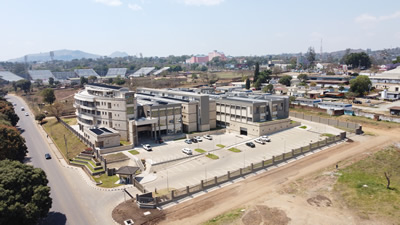SAIW Spearheads Internationally Accredited Training for Malawi’s NDT Sector
 In an effort to enhance their technical capabilities and establish a testing and training centre, experienced professionals from Malawi have completed an intensive training programme provided by the Non-Destructive Testing (NDT) division at the Southern African Institute of Welding (SAIW).
In an effort to enhance their technical capabilities and establish a testing and training centre, experienced professionals from Malawi have completed an intensive training programme provided by the Non-Destructive Testing (NDT) division at the Southern African Institute of Welding (SAIW).
The training initiative, supported by the International Atomic Energy Agency (IAEA), aimed to equip the students with the necessary skills and certifications in non-destructive testing techniques.
The SAIW has been involved with the IAEA since 2000 as part of the African Regional Cooperative Agreement for Research, Development and Training related to Nuclear Science and Technology (AFRA)
The SAIW, as the AFRA Anglophone Regional Designated Centre (RDC) for NDT, has been involved in the direct training of more than 160 NDT Personnel in four methods up to Level 3 from more than 17 English-speaking countries in Africa.
Malawian expertise
The Malawian delegation was made up of Stephen Chalimba, Bill Gwaza and Christopher Kasonga from the Malawi Bureau of Standards and Barness Mphande, from the Malawi University of Business and Applied Sciences (MUBAS).
Chalimba highlighted the support received from the IAEA and the proximity of South Africa as major factors in choosing SAIW for training. He mentioned the potential for tapping into South Africa’s expertise and specialised services after the training.
Gwaza also emphasized the significance of international welding accreditation for Malawi’s welding sector. “Local Malawian industries are increasingly seeking experts with international qualifications for key new build and renewal/maintenance projects in key economic sectors including the hydropower, agro-processing and mining industries. The establishment of international qualifications will provide Malawi with a competitive edge and meet industry demands,” he explained.
A comprehensive curriculum
The SAIW training program, which began in January 2023, covered a wide range of non-destructive testing techniques under the guidance of the SAIW’s in-house NDT experts including Personnel Qualification and Certification Manager Manager Harold Jansen and Senior Lecturer Jan Cohen who have provided valuable insights and instruction throughout the training sessions.
The students received theoretical and practical training in liquid penetrant testing, magnetic particle inspection, radiography testing, ultrasonic testing, visual inspection testing, and eddy current testing. The comprehensive curriculum also enabled them to gain hands on experience and enhance their theoretical knowledge.
The Malawian students also completed exams for the Visual Testing Level 2 and Eddy Current Testing modules before concluding their training program. The knowledge and skills gained during their time at SAIW will be instrumental in their future endeavours to enhance the welding and testing capabilities in Malawi.
Forging future growth
Upon completion of the training program, the students have just returned to Malawi and will now focus on establishing an NDT testing and training hub of excellence. The testing centre will be located within the Malawi Bureau of Standards, while the training centre will be located at the Malawi University of Business and Applied Sciences. This collaborative effort aims to ensure a seamless integration between the two facilities and cater to the growing demand for international welding accreditation and non-destructive testing services in Malawi.
Looking at the broader significance of the programme the SAIW’s Harold Jansen comments; “The collaboration between the SAIW and the Malawian institutions, supported by the IAEA, marks a significant step towards strengthening technical expertise and promoting international standards in welding and non-destructive testing in Malawi. With the establishment of the testing and training centre, the country is poised to meet the increasing demand for skilled professionals in key industries such as agro-processing, power generation, and petroleum.
“The acquired expertise and certifications of the Malawian students will also play a pivotal role in driving economic growth and ensuring the longevity of critical infrastructure projects in the country,” he concludes.


